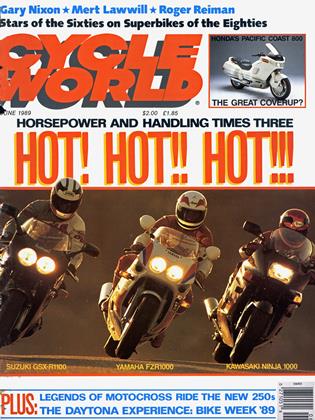GOOD OLD DAYS
A win to be proud of
MY FIRST SUPERCROSS WIN, THE 1978 Superbowl of Motocross, was great. My start wasn't too good—midpack or worse—but Bob Hannah also got a bad start, which wasn't too unusual for him, and I knew he could come from behind and win. So, I figured this was my chance to jump in behind him and find out how he did it. We passed a lot of riders, but I really didn't know for sure what place we were in.
“1 hen the one-lap flag came out and Hannah ran off the track but didn't fall, and returned to the race right behind me. He was trying to pass on the inside of every turn, his front tire rubbing against my leg! I didn't even know I was leading until I came around to the finish and got the checkered flag.
“ When I awoke the next morning, I thought I had been dreaming. But. there, sitting on my dresser was the first-place silver bowl. My father had placed it there during the night: I'll never forget how proud he was.”
Works rider at age 17
WAS I 7 YEARS OLD AND A PRIVATEER RIDING A 1 25 Monark when I won the 1973 national at Hangtown. I was still in school and the importance of winning a national was just starting to sink in by Thursday of the following week. On Friday, the phone rang and it was American Honda wanting me to come up and talk to them. By the middle of the next week I had signed a one-year contract with a salary of $35,000. Naturally, I was on a high and went right out and bought a bunch of toys, including a Porsche Targa. My father told me Í should invest some of the money, too, and he helped me buy a house.
“I continued going to school. I'd fly to the race on Friday and back home on Monday, so I missed quite a few days, but still graduated with a B-plus average.”
Inventing the double-jump
REMEMBER THE FIRST TIME I WENT TO A track that had two jumps close together. Jimmy Ellis and I stopped and looked at them during practice, wondering if it was possible to clear them in one jump; doubleand triple-jumping hadn't yet been attempted. We both thought it might be possible, but we were scared. So we practiced by hitting the first jump at an angle so we would land on flat ground, past and to the side of the second jump. We found that it was possible to clear both jumps, but, still, we were reluctant to try it.
“In the race I got a bad start, but went from sixth place to first when I did the double-jump. The crowd went crazy; they had never seen anything so radical. I didn’t win, though, because the bike’s wheels exploded. The next day I went to a Harley dealer, bought the biggest spokes they had and modified them to fit my Can-Am’s wheels.”
A privateer in Europe
HEN I WON MY FIRST GP IN BARCElona, Spain, I was a privateer. I had a strong desire to race on the world GP circuit, so I had saved what I thought would be enough money for four GPs and went over to Europe. But everything was so expensive. I was broke by the time that first race started. I didn't know what Í was going to do. The start money wasn't enough to get me very far.
“Even with the prize money I made for winning that race, I was trying to figure out how I could get the money to go to a few more races. But I guess my winning the Spanish GP on a stock Bultaco—I had changed the tires, grips and the fork-had impressed the factory representatives. Bultaco got in touch with me and suddenly I was a factory rider! It was a high I’ll never forget.”












